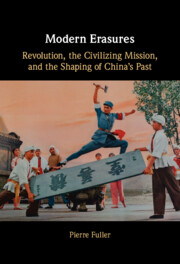Book contents
- Modern Erasures
- Modern Erasures
- Copyright page
- Dedication
- Contents
- Figures and Maps
- Acknowledgments
- Note on the Text
- Introduction
- Part I Seeing and Not Seeing
- Part II Revolutionary Memory in Republican China
- Part III Maoist Narratives in the Forties
- Part IV Politics of Oblivion in the People’s Republic
- 10 Communal Memory
- 11 The National Subsumes the Local: The Fifties
- 12 Culture as Historical Foil: The Great Leap Forward
- 13 Politics of Oblivion: The Cultural Revolution
- Conclusion
- Glossary
- Bibliography
- Index
13 - Politics of Oblivion: The Cultural Revolution
from Part IV - Politics of Oblivion in the People’s Republic
Published online by Cambridge University Press: 31 March 2022
- Modern Erasures
- Modern Erasures
- Copyright page
- Dedication
- Contents
- Figures and Maps
- Acknowledgments
- Note on the Text
- Introduction
- Part I Seeing and Not Seeing
- Part II Revolutionary Memory in Republican China
- Part III Maoist Narratives in the Forties
- Part IV Politics of Oblivion in the People’s Republic
- 10 Communal Memory
- 11 The National Subsumes the Local: The Fifties
- 12 Culture as Historical Foil: The Great Leap Forward
- 13 Politics of Oblivion: The Cultural Revolution
- Conclusion
- Glossary
- Bibliography
- Index
Summary
This final chapter probes the extent to which tensions between communal and revolutionary perceptions of the past can help explain the continued potency of political labels two decades into the People’s Republic. The chapter pursues these tensions for what they say about the relationship between epistemic and physical violence in Maoist ideology and practice. One of the main cultural aspects of the late sixties Cultural Revolution was the question of reproduction into the future for certain cultural forms – and oblivion for others. The chapter then turns to the human side of this destruction. The sixties saw an expansion of class through a stress on personal or family background that brought historical understanding to the fore of class struggle, a basis on which eliminationist and collective killings were conducted along bygone class lines. Finally, it considers the sixties in China in the broader context of state and civilian violence in the twentieth-century world and its roots in the civilizing mission of the colonial project.
Keywords
- Type
- Chapter
- Information
- Modern ErasuresRevolution, the Civilizing Mission, and the Shaping of China's Past, pp. 273 - 292Publisher: Cambridge University PressPrint publication year: 2022



